
The First Epistle of Peter is a book of the New Testament. The author presents himself as Peter the Apostle. The ending of the letter includes a statement that implies that it was written from “Babylon”, which may be a reference to Rome. The letter is addressed to the "chosen pilgrims of the diaspora" in Asia Minor suffering religious persecution.

The First Epistle of John is the first of the Johannine epistles of the New Testament, and the fourth of the catholic epistles. There is no scholarly consensus as to the authorship of the Johannine works. The author of the First Epistle is termed John the Evangelist, who most modern scholars believe is not the same as John the Apostle. Most scholars believe the three Johannine epistles have the same author, but there is no consensus if this was also the author of the Gospel of John.

Mark 16 is the final chapter of the Gospel of Mark in the New Testament of the Christian Bible. Christopher Tuckett refers to it as a "sequel to the story of Jesus' death and burial". The chapter begins after the sabbath has ended, with Mary Magdalene, Mary the mother of James, and Salome purchasing spices to bring to the tomb next morning to anoint Jesus' body. There they encounter the stone rolled away, the tomb open, and a young man dressed in white who announces the resurrection of Jesus. The two oldest manuscripts of Mark 16 conclude with verse 8, which ends with the women fleeing from the empty tomb, and saying "nothing to anyone, because they were too frightened".

The Revised Standard Version (RSV) is an English translation of the Bible published in 1952 by the Division of Christian Education of the National Council of the Churches of Christ in the USA. This translation itself is a revision of the American Standard Version (ASV) of 1901, and was intended to be a readable and literally accurate modern English translation which aimed to "preserve all that is best in the English Bible as it has been known and used through the centuries" and "to put the message of the Bible in simple, enduring words that are worthy to stand in the great Tyndale-King James tradition."

The New Revised Standard Version (NRSV) is a translation of the Bible in contemporary English. Published in 1989 by the National Council of Churches, the NRSV was created by an ecumenical committee of scholars "comprising about thirty members". The NRSV relies on recently published critical editions of the original Hebrew, Aramaic, and Greek texts. A major revision, the New Revised Standard Version Updated Edition (NRSVue), was released in 2021.

The Joseph Smith Translation (JST), also called the Inspired Version of the Holy Scriptures (IV), is a revision of the Bible by Joseph Smith, the founder of the Latter Day Saint movement, who said that the JST/IV was intended to restore what he described as "many important points touching the salvation of men, [that] had been taken from the Bible, or lost before it was compiled". Smith was killed before he deemed it complete, though most of his work on it was performed about a decade beforehand. The work is the King James Version of the Bible (KJV) with some significant additions and revisions. It is considered a sacred text and is part of the canon of Community of Christ (CoC), formerly the Reorganized Church of Jesus Christ of Latter Day Saints, and other Latter Day Saint churches. Selections from the Joseph Smith Translation are also included in the footnotes and the appendix of the Latter-day Saint edition of the LDS-published King James Version of the Bible. The Church of Jesus Christ of Latter-day Saints' edition of the Bible includes selections from the JST in its footnotes and appendix. It has officially canonized only certain excerpts that appear in the Pearl of Great Price. These excerpts are the Book of Moses and Smith's revision of part of the Gospel of Matthew.
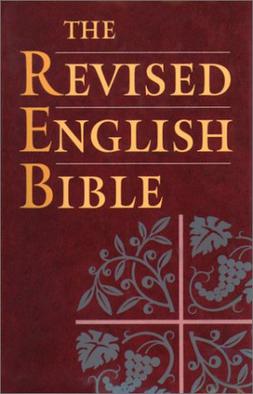
The Revised English Bible (REB) is a 1989 English-language translation of the Bible that updates the New English Bible (NEB) of 1970. As with its predecessor, it is published by the publishing houses of both the universities of Oxford and Cambridge. It is not to be confused with the Revised English Bible of 1877, which was an annotated and slightly emended King James Bible.
1 Esdras, also Esdras A, Greek Esdras, Greek Ezra, or 3 Esdras, is the ancient Greek Septuagint version of the biblical Book of Ezra in use within the early church, and among many modern Christians with varying degrees of canonicity. 1 Esdras is substantially similar to the standard Hebrew version of Ezra–Nehemiah, with the passages specific to the career of Nehemiah removed or re-attributed to Ezra, and some additional material.

The Oxford Annotated Bible (OAB), also published as the New Oxford Annotated Bible (NOAB), is a Study Bible published by the Oxford University Press. The notes and the study material feature in-depth academic research from nondenominational perspectives, specifically secular perspectives for "Bible-as-literature" with a focus on the most recent advances in historical criticism and related disciplines, with contributors from mainline Protestant, Roman Catholic, Jewish, and nonreligious interpretative traditions.
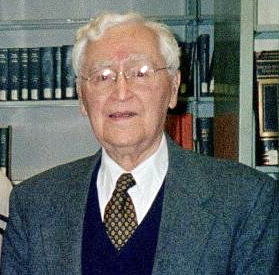
Bruce Manning Metzger was an American biblical scholar, Bible translator and textual critic who was a longtime professor at Princeton Theological Seminary and Bible editor who served on the board of the American Bible Society and United Bible Societies. He was a scholar of Greek, New Testament, and New Testament textual criticism, and wrote prolifically on these subjects. Metzger was an influential New Testament scholar of the 20th century. He was elected to the American Philosophical Society in 1986.
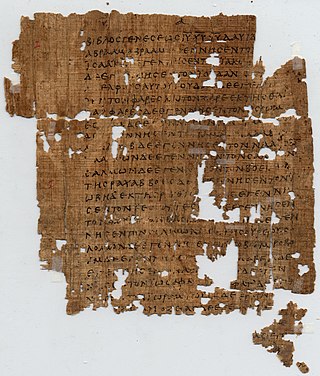
Matthew 24 is the twenty-fourth chapter of the Gospel of Matthew in the New Testament of the Christian Bible. It commences the Olivet Discourse or "Little Apocalypse" spoken by Jesus Christ, also described as the Eschatological Discourse, which continues into chapter 25. It contains Jesus' prediction of the destruction of the Temple in Jerusalem. Mark 13 and Luke 21 also cover the same material.

Luke 4 is the fourth chapter of the Gospel of Luke in the New Testament of the Christian Bible, traditionally attributed to Luke the Evangelist, a companion of Paul the Apostle on his missionary journeys. This chapter details Jesus' three temptations, the start of his "Galilean Ministry", and his rejection at Nazareth, which Luke contrasts with his acclaim in nearby Capernaum.
There have been various debates concerning the proper family of biblical manuscripts and translation techniques that should be used to translate the Bible into other languages. Biblical translation has been employed since the first translations were made from the Hebrew Bible into Greek and Aramaic. Until the Late Middle Ages, the Western Church used the Latin Vulgate almost entirely while the Eastern Church, centered in Constantinople, mostly used the Greek Byzantine text. Beginning in the 14th century, there have been increasing numbers of vernacular translations into various languages. With the development of modern printing techniques, these increased enormously.

Matthew 15 is the fifteenth chapter in the Gospel of Matthew in the New Testament section of the Christian Bible. It concludes the narrative about Jesus' ministry in Galilee and can be divided into the following subsections:
The additions of Daniel are three chapters not found in the Hebrew/Aramaic text of Daniel. The text of these chapters is found in the Koine Greek Septuagint, the earliest Old Greek translation.
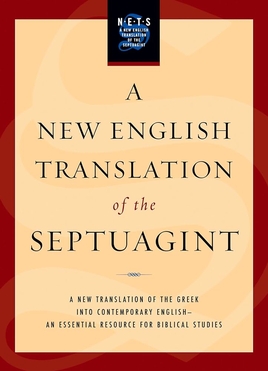
The New English Translation of the Septuagint and the Other Greek Translations Traditionally Included under That Title (NETS) is a modern translation of the Septuagint (LXX), that is the scriptures used by Greek-speaking Christians and Jews of antiquity. The translation was sponsored by the International Organization for Septuagint and Cognate Studies (IOSCS). The Psalms were published in 2000 and the complete Septuagint in 2007.
The Wesley Study Bible is a Methodist-oriented biblical study text with introductory text for each book, explanations and commentary 'to help the reader to understand the biblical text', and with 'special references to the writings of John Wesley'.
The Open English Bible (OEB) is a freely redistributable modern translation based on the Twentieth Century New Testament translation. A work in progress, with its first publication in August 2010, the OEB is edited and distributed by Russell Allen. It is licensed with a Creative Commons zero license, which allows free use of the content and allows forking of the content and a new translation to be made based on it. Its name and the distribution of all text and related software through GitHub reinforce the open source approach.

Romans 1 is the first chapter of the Epistle to the Romans in the New Testament of the Christian Bible. It is authored by Paul the Apostle, while he was in Corinth in the mid-50s AD, with the help of an amanuensis (secretary), Tertius, who adds his own greeting in Romans 16:22. Acts 20:3 records that Paul stayed in Greece, probably Corinth, for three months. The letter is addressed "to all in Rome who are loved by God and called to be saints".
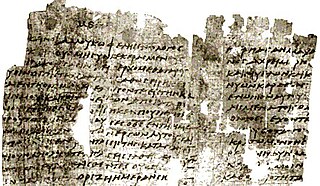
Hebrews 8 is the eighth chapter of the Epistle to the Hebrews in the New Testament of the Christian Bible. The author is anonymous, although the internal reference to "our brother Timothy" causes a traditional attribution to Paul, but this attribution has been disputed since the second century and there is no decisive evidence for the authorship. This chapter contains the exposition about the better ministry of the New Covenant.












